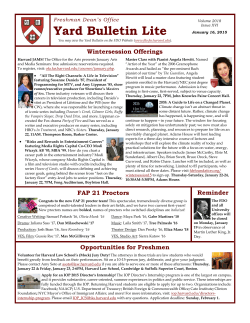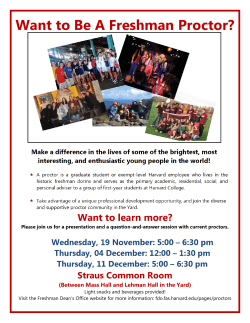
CV - CS-People by full name
David G. Sullivan, Ph.D. Curriculum Vitae March 26, 2015 Office Address Department of Computer Science Boston University, College of Arts and Sciences 111 Cummington Mall Boston, MA 02215 tel: 617-353-8919; fax: 617-353-6457 email: dgs@cs.bu.edu web: http://cs-people.bu.edu/dgs Education Harvard University, Ph.D. in computer science, November 2003 Harvard University, S.M. in computer science, 1999 Emmanuel College, coursework in education, 1993-1994 Harvard College, A.B. in physics, 1991, cum laude in general studies Professional Appointments 2013–present Senior Lecturer on Computer Science, Boston University, College of Arts and Sciences 2006–2013 Lecturer on Computer Science, Boston University, College of Arts and Sciences 2000–present Instructor, Harvard University, Division of Continuing Education Spring 2007 Lecturer on Computer Science, Tufts University Fall 2006 Lecturer on Computer Science, Harvard University, Faculty of Arts and Sciences 2000-2005 Consultant, Sleepycat Software (now part of Oracle Corporation) 1999 Summer research intern, BBN Technologies, Cambridge, MA 1997-2003 Research assistant, Harvard University, Faculty of Arts and Sciences (also served as a teaching fellow for four semesters during that time) 1991-1997 Instructor, St. John’s Preparatory School, Danvers, MA Honors Neu Family Award for Excellence in Teaching, Boston University, 2012 Teaching Commendations, Harvard University Extension School, spr '07, fall '10, fall '11, fall '12, spr '14 Certificate of Distinction in Teaching, Harvard University, 1999 USENIX Association Scholar, 1999 C.S. Gross Scholarship, Harvard Division of Engineering and Applied Sciences, 1998, 1999 Harvard Graduate National Scholarship, 1997-1999 Honorable Mention, NSF Graduate Fellowship Competition, 1998 Phi Beta Kappa, Harvard College, 1991 Detur Prize, Harvard College, 1987 Teaching at Boston University 1. CS 105: Introduction to Databases and Data Mining Developed this new course, which provides non-majors with a data-centric introduction to computer science, and taught its first offering in Spring '07. Taught one section each fall and spring semester since then. Work with students on final projects in which they choose a dataset of interest and explore it using techniques learned during the course. A sample of these projects can be found here: http://cs-people.bu.edu/dgs/courses/cs105/hall_of_fame David G. Sullivan, Ph.D. curriculum vitae page 1 of 3 2. CS 111: Introduction to Computer Science I Taught one section in Fall '06, and two sections each fall semester since then. Taught one section Spring '08-'11, and two spring sections since Spring '12. In Fall '10, introduced a new one-week unit at the start of the course in which students use a graphical programming language called Scratch to quickly become familiar with key concepts in a more intuitive manner. Wayne Snyder has since made use of this unit in the context of MA/CS 109. In Spring '11, taught a special Honors Program section for Harleen Grewal '13. In Spring '12, introduced a new undergraduate course assistant (CA) program, in which undergrads assist with the weekly labs and offer regular office hours. I have continued to coordinate this program, and I have worked with Wayne Snyder to extend the program to CS 112. In Fall '14, introduced the use of peer instruction and transitioned to a new breadth-first curriculum that was developed at Harvey Mudd College. 3. CS 112: Introduction to Computer Science II Taught one section in Fall '06 that combined CS students taking the course in Java with engineering students taking the course in C++. 4. CS 460/660: Introduction to Database Systems Taught one section in Fall '13. CS 460 is the undergraduate version of the course, and CS 660 is its graduate-credit counterpart. Other University Teaching (as the instructor of record) 1. CSCI S-111: Intensive Introduction to Computer Science, Harvard Summer School 2000-2014. (Co-taught with Henry H. Leitner, Ph.D. until 2013.) 2. CSCI E-50b: Introduction to Computer Science Using Java II, Harvard Extension School Spring '04. 3. CSCI E-22 (formerly CSCI E-119): Data Structures, Harvard Extension School Spring '05, '07, '08. Fall '05, '09, '10, '11, '12, '13, '14. 4. CSCI E-66 (formerly CSCI E-268): Database Systems, Harvard Extension School Spring '06, '11, '12, '13, '14, '15. Fall '06. 5. CS 165: Information Management, Harvard University, Faculty of Arts and Sciences Fall '06. 6. CS 115: Database Systems, Tufts University. Spring '07. Departmental Service Member, Committee on Rethinking Entry Points to the Major, 2013-present Member, Search Committee for Full-Time Lecturer, 2013 Member, Undergraduate Curriculum Committee, 2013 Coordinator, Undergraduate Course Assistant Program, 2012–present Guest lecturer, BU Artemis Program (summer program in CS for high-school girls), 2011-2013 Member, Committee on Courses for Non-Majors, 2011 Member, Committee on Redesigning CS 101 (RULE Grant), 2010 Member, Committee on the Transition from CS 111 to CS 112, 2009-2010 Member, Committee on Courses for Non-Majors, Fall 2007 David G. Sullivan, Ph.D. curriculum vitae page 2 of 3 Student Advising Supervisor/mentor to numerous teaching fellows at BU, including a number of novice teachers Supervisor/mentor to 22 undergraduate course assistants for CS 111 Informal advisor to part-time lecturers in the department Independent study advisor for Jason Abed '11, Fall 2010 Thesis advisor for BU Academy student Charles McGarey (BUA '14), 2013-2014 Thesis advisor for BU Academy student Daniel Housley (BUA '10), 2009-2010 Summer advisor for incoming students, 2008, 2009, 2011 Invited Talks Revamping the First Course for Majors: A Preliminary Report, Computer Science Department, University of Massachusetts, Boston, March 26, 2015. Providing Students with Computational Tools for Working with Data, Boston University Center for Excellence and Innovation in Teaching, January 10, 2013. Publications [1] David G. Sullivan. A data-centric introduction to computer science for non-majors. In Proc. of the 44th ACM Technical Symposium on Computer Science Education (SIGCSE '13), 2013, pp. 71-76. [2] David G. Sullivan. Video notes for Y. Daniel Liang’s Intro. to Programming Using Python (Pearson, 2011). [3] David Gerard Sullivan. Using probabilistic reasoning to automate software tuning. Ph.D. thesis, Harvard University, September 2003. [4] Barbara J. Grosz, Sarit Kraus, David G. Sullivan, and Sanmay Das. The influence of social norms and social consciousness on intention reconciliation. Artificial Intelligence 142(2002):147-177. [5] David G. Sullivan and Margo I. Seltzer. Isolation with flexibility: a resource management framework for central servers. In Proc. of the 2000 USENIX Annual Technical Conference, 2000, pp. 337-350. [6] David G. Sullivan, Barbara J. Grosz, and Sarit Kraus. Intention reconciliation by collaborative agents. In Proc. of the 4th International Conference on Multi-Agent Systems, 2000, pp. 293-300. [7] David G. Sullivan, Alyssa Glass, Barbara J. Grosz, and Sarit Kraus. Intention reconciliation in the context of teamwork: an initial empirical investigation. In Klusch, M., Shehory, O., Weiss, G., eds., Cooperative Information Agents III, Lecture Notes in Artificial Intelligence 1652, 1999, pp. 149-162. [8] David G. Sullivan, Robert Haas, and Margo I. Seltzer. Tickets and currencies revisited: extending multiresource lottery scheduling. In Proceedings of the 7th Workshop on Hot Topics in Operating Systems, IEEE Computer Society Press, 1999, pp. 148-152. Other Relevant Experience/Credentials Textbook reviewer, Addison-Wesley, John Wiley & Sons, Pearson, 2007–present Teaching consultant, Bok Center for Teaching and Learning, Harvard University, 1999-2002 Non-resident tutor, Pforzheimer House, Harvard University, 1999-2002 Co-moderator, First-Year Sexual Orientation Discussion Group, Harvard, 2000-2003 Massachusetts Educator's License, secondary-school mathematics and physics David G. Sullivan, Ph.D. curriculum vitae page 3 of 3
© Copyright 2025









